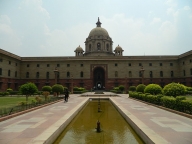New Delhi (IANS) In the ongoing war against corruption and weeding out the corrupt from within the bureaucracy, the Prime Minister’s Office has launched a fresh crackdown.
All Central government departments have now been asked to provide a list of expendable and corrupt officers every few months so that the entire system is flushed clean. Despite exemplary punishment having been meted out including immediate termination, the threshold levels are still being breached by many in the bureaucracy.
Despite promising clean governance, the PM and his office have observed that complaints continue to pile up. Moreover, it has been found that officers against whom previously filed complaints continue to rise are able to seamlessly move up the ranks in parallel. This is most curious given that levels of inspection have been strengthened. As many as 1,007 officers with dubious disciplinary records are being scrutinised. Zero tolerance against corruption has been the norm over the last five years but yet, corruption on the ground refuses to go away.
So, a new tack has been devised, abnormal property or other asset transactions which are not commensurate with incomes or are blatantly disproportionate will be red-flagged for expeditious disposal.
The PMO note categorically asserts: “On a review of the matter recently at the PMO, it was decided that a quick uploading of the current information and regular periodic updating of the same by all stakeholder departments has to be ensured.”
New provisions have now been put in place and heightened vigil is reportedly going to pay off. Vigilance wings across government departments are now investigating complaints against 29 IAS officers and nine group ‘A’ officers, while investigations against 1,815 officers from the ‘B’ and ‘C’ groups have been accelerated.
A list of 14 officers from the Ministry of Railways, 12 officers under Ministry of Coal and six officers from the Ministry of Civil Aviation is being examined along with an unspecified number of officers from the Ministry of Shipping under rule FR 56 (J) for compulsory retirement.
This rule empowers the government to force compulsory retirement on corrupt officers who have completed 30 years of qualifying service or have attained 50 years of age.
As per the rule: “Notwithstanding anything contained in this rule, the appropriate authority shall, if it is of the opinion that it is in the public interest so to do, have the absolute right to retire any government servant by giving him notice of not less than three months in writing or three months pay and allowances in lieu of such notice.”
The screening committee of the Central Board of Indirect Taxes and Customs (CBIC) – that recently recommended sacking 37 corrupt officers – is likely to meet in the third week of November to review more such cases forwarded by different commissionerates under their jurisdiction.
A strong directive has also been issued to more than 600 autonomous bodies under the Central government to carry out a similar review. The note adds: “Each ministry/department will undertake a comprehensive review of action taken by all autonomous bodies under their control in time bound manner for further consideration.”

